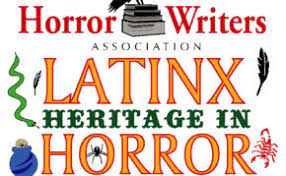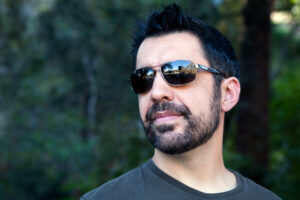
Michael Paul Gonzalez is the author of the novels BENEATH THE SALTON SEA, ANGEL FALLS, and MISS MASSACRE’S GUIDE TO MURDER AND VENGEANCE and creator of the serial horror audio drama podcast LARKSPUR UNDERGROUND.
An Active Member of the Horror Writers Association, his short stories have appeared in print and online, including the Chiral Mad 5, Qualia Nous vol. 2, Flame Tree Press Anthologies Endless Apocalypse and Gothic Fantasy: Chilling Horror Stories. He has also appeared in Tales from the Crust: A Pizza Horror Anthology, Where Nightmares Come From, Lost Signals, HeavyMetal.com, and Fantastic Tales of Terror. He resides in Los Angeles, a place full of wonders and monsters far stranger than any that live in the imagination.

What inspired you to start writing?
I needed an outlet for the ideas rattling in my brain. I’ve always loved different genres and styles of storytelling. As a kid, I would watch a movie and wonder what happened next. I’d imagine the next journey for Jack Burton after Big Trouble in Little China, tell epic stories of GI Joe averting World War III or Jem and the Holograms putting on the concert of a lifetime to seal a demonic portal to hell (whoever is in charge of Jem tie-ins, call me!).
I started college as a music major, switched to acting, then moved to playwriting. From there, I realized that I enjoyed creating work that caused a reaction in people (theater is a fantastic way to get instant feedback on your work, for better or worse). Collaborative arts like theater and audio drama are also a way to help you hone your writing process. I think it’s imperative to explore as many facets of art as possible to expand your thinking. If you like hip-hop, listen to some country. Like horror? Watch a few Hallmark romcoms. There’s always something to inspire you or moments worth stealing—er, adapting.
What was it about the horror genre that drew you to it?
Fear. The creation of fear, the control of fear, the healing power of moving through an inferno and coming out changed but unscathed. Horror lets you experience things that you’ll (hopefully) never see in real life. It also allows you to process trauma and pain in a safe way. On a lighter side, it can be fun as hell! Some of the best laughs and biggest thrills come from horror.
Do you make a conscious effort to include LatinX characters and themes in your writing and if so, what do you want to portray?
I didn’t at first, because there seemed to be expectations saddled on ethnic characters. Then I realized that the only way out of that hole was to start writing LatinX and other marginalized characters in as diverse a way as possible. The only way to break those cookie-cutter molds (the Fast-Talking Spicy Latino Best Friend, the Streetwise Hustler, the Fill-in-the-Blank) was to create stories featuring The Normal Mom, the Girl Trying to Figure Her Life Out while a biological weapon tracks her down, the Mom and Dad Trying to Keep Their Shit Together After Their Kid Goes Missing, but to view all of that through the lens of being LatinX (which is more of a kaleidoscope than a lens, I guess). Write, and write diversely, but make a conscious effort to keep respect. Once you’re out of your lane writing characters who aren’t from your cultural experience, research and connect with those communities to make sure you’re respectful and authentic.
What has writing horror taught you about the world and yourself?
It didn’t teach me that the world is a dark place (it is) where bad things happen (a lot). It taught me that the world doesn’t have to be those things. We get through adversity by working together. We lose when we split up to try to do things faster or we run solo towards a fight that would be better solved with time and teamwork. We have to be the light in the world, and that doesn’t mean it will be easy or safe or that pain won’t be involved. Staying together is what gets us through. And when you’re alone, you do what it takes to survive while making sure you don’t lose yourself in the process.
How have you seen the horror genre change over the years? And how do you think it will continue to evolve?
I think many marginalized writers are drawn to horror because it’s a marginalized genre! I’ve enjoyed watching horror expand its boundaries to be more inclusive. There’s always room for improvement, but there have been more sustained efforts to welcome and encompass diverse communities. If you’re not reading LatinX horror, Black horror, Trans horror, Gay horror, Asian horror, Native horror, you are missing out on some amazing voices! Put your prejudices aside (what is prejudice but unfocused fear?) and you’ll realize that there’s a human bond connecting us all. I’ve also enjoyed watching the “I only read literary fiction” crowd slowly come to realize that horror is a legitimate genre of storytelling worthy of respect. The contortions they go through (It’s elevated horror!) to justify making it “acceptable” to read entertains me to no end. A lot of critics tend to think anything that can be tagged as genre isn’t worthy of respect, without realizing that everything is genre. Greater acceptance of horror will lead to people casting a wider net to find stories that resonate for them.
How do you feel the LatinX community has been represented thus far in the genre and what hopes do you have for representation in the genre going forward?
It’s been a slow climb toward recognition, but in the last couple of years, we have some great voices roaring through! Cina Pelayo, V Castro, Silvia Morena-Garcia, Carmen Maria Machado, Lauren Candia, Gabino Iglesias, Samantha Schweblin, and the list goes on! The LatinX community is diverse and deep, able to draw from a myriad of lived experiences to use horror to reveal truth to the world. I think one of the greatest aspects of LatinX horror fiction is how many women lead the way for us as storytellers. We’re all trying to set a new standard with every story we tell, reclaiming words, language, and lore as quickly as we can!
Who are some of your favorite LatinX characters in horror?
We’re good at creating legendary monsters and folktales – La Llorona, El Chupacabra, El Culebrón, Pishtaco. There’s a whole vein of rich monster-y heritage waiting to be tapped and unleashed on the world. The titular Dolores Roach as played by Daphne Rubin-Vega on the Audio Drama Podcast The Horror of Dolores Roach. I’ve also loved how firmly The Addams Family has become Latino, from Raul Julia’s incomparable Gomez to Jenna Ortega’s iconic take on Wednesday. I’m hoping someday some of my creepy monsters will find a place on these lists!
Who are some LatinX horror authors you recommend our audience check out?
Mariana Enriquez (Our Share of Night), Silvia Moreno-Garcia (The Daughter of Doctor Moreau), V Castro (Mestiza Blood AND she got to do a tie-in for Vasquez from Aliens!), Carlos Allende (Coffee, Shopping, Murder, Love), Cina Pelayo (Loteria), Daniel José Older (Bone Street Rumba, fantasy with darker elements).
What is one piece of advice you would give horror authors today?
Keep horror fun! It’s such a huge palette of colors to choose from. Get away from those greys, purples, and blacks, and give me some hot pink and neon green horror! If you usually write intense, visceral scenes, see if you can write a terrifying story where not a drop of blood is spilled. If you only dabble in the ethereal/unknowable, try pushing yourself to write something immediate and intense. Write YA, write a romance! Don’t allow yourself to get pigeonholed into a certain style, even if it’s your signature style. Expand your sandbox and you might find new readers and new sides of yourself!
And to the LatinX writers out there who are just getting started, what advice would you give them?
Most beginner writers only focus on the fun (but unlikely) things – selling a story every month (or year! Or ever!), getting nominated for awards, doing readings or signings with massive crowds. Those aren’t guaranteed. I’ve done readings to raucous, packed houses, and signings where my mom & dad were the only attendees. Writing is a rollercoaster of elation and humiliation, so learn to enjoy the highs and endure the troughs.
You can write for free a few times, but don’t make a habit out of it. Always try paying markets first.
Most importantly – search for consistency. There’s only one factor you can control – the actual writing. You have the time to write. Use it. Write every day, whether that’s outlining something new, editing something old, or thinking of ideas while walking your dog. Even if it’s only a paragraph or an idea for something scribbled on the back of a receipt. Kick your kids out of the house for an hour. Lock yourself in a room. Get up thirty minutes earlier. Whatever it takes!
Lastly (but especially) – make sure they spell your name right!
You can visit Michael online here.

